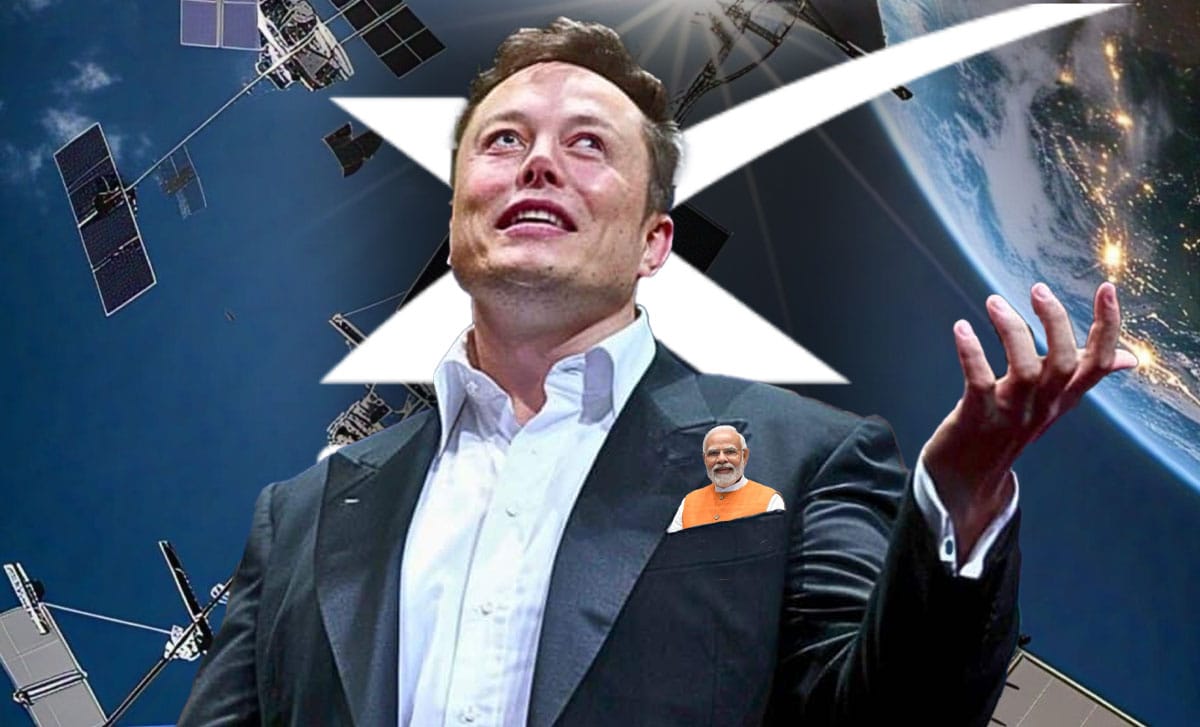
As India moves closer to licensing SpaceX’s Starlink satellite internet service, owned by multi-billionaire Elon Musk, India must assess the risks to national sovereignty. The real question remains: Is India handing over the keys to its skies to an American billionaire?
Ukraine stands as an example for India. Starlink was switched off during critical junctures during the Russia-Ukraine conflict. This left Ukraine vulnerable, not only to Russia but to the whims of one man. Elon Musk himself boasted that the “entire front line would collapse if I turned it off.” What greater evidence do we need that this is not just technology, it is hard power?
Musk limited Ukraine's ability to use its satellite internet service for military purposes after reports that Kyiv used it to control drones. This move left Ukraine helpless, turning towards a figure that is too far to hear its cries for help. Although Ukrainian officials have admitted to relying too much on Starlink, they were unable to locate a comparable service in terms of coverage or quality. That's the trap India is walking into, complete dependence with no backup plan.
Politico, an international media organisation, quoted Eutelsat, a Franco-British operator, Chief Executive Officer, saying Starlink “is a dependence that can be decided in the White House or [Trump's private residence] Mar-a-Lago." The comments hint at the use of Starlink for political motives by the US. Starlink is not just a communication system, it's a leash. A leash that India should never allow around its neck.
Trojan Horse
Satellite connectivity has become a backbone of modern warfare, border security and disaster relief. Where does this leave India, which is planning to give full approval to Starlink? Imagine if India’s capabilities to defend itself relied on the politics of the US, which has adopted many policies that hinder India’s growth. Even worse, in the hands of American businesses that support hostile nations such as Pakistan.
Starlink is anticipated to start operations in Pakistan by the end of 2025 after obtaining provisional approval to do so. With Pakistan being the major threat to India, how can Starlink unequivocally support Pakistan and India? India, recently on the brink of war with Pakistan, showed an immense display of courage and technology. The S-400, a surface-to-air missile system, was applauded all around the world for its accurate performance in intercepting Pakistan’s rockets.
Our defence forces stood strong. We didn’t need handouts. What if that same system relied on a foreign satellite provider tomorrow? This is technological dependence. The battlefield today is not just land, air, or sea. It’s space and cyberspace. If India doesn't own the backbone of that battlefield, it doesn't own its future.
‘Make in India’ for Security
With defence exports rising thirtyfold in the last decade, thanks to the vision of Prime Minister Narendra Modi and the BJP. India has become a go-to destination for third-world countries to buy cheap yet effective defence technology. If Indian systems were guided by the Starlink network, and Musk chose to hit the kill switch, the entire nation would have to beg for mercy from the billionaire. That is not strategic autonomy. That is digital dependency.
Another lucrative investment destination in India happens to be the space economy. According to a FICCI-EY analysis, India's space economy is expected to grow from $8.4 billion in 2022 to a staggering $44 billion by 2033. With over 40 lakh users worldwide, Starlink is reportedly gaining thousands more every week. It targets the profitable satellite broadband service industry in India and is offered by more than 100 businesses.
Policy changes, commercial sector involvement, and enhanced international cooperation aided by the Indian space policy and organisations like IN-SPACe and NSIL are driving this expansion. Starlink could crowd out the burgeoning Indian space sector, monopolising the satellite broadband. That means fewer incentives for private capital to back homegrown alternatives.
Starlink’s Market Capture
Bharti Airtel and Reliance Jio, the two biggest players in the telco sector, have signed separate strategic agreements with Starlink. After, Bharti Airtel invested heavily in the OneWeb satellite network, and Reliance Jio formed a joint venture with SES’s O3b constellation to develop a homegrown LEO broadband service. This move underscores the power of Elon and Starlink, making the giants of Indian industry pave the way for him.
The government has begun the process of allocating spectrum to Starlink almost three years after the company first applied for an operator licence. This approval brings us closer to the reality of Starlink beginning services nationwide; reversing this decision might be impossible.
The BJP’s Responsibility
The BJP has been the vanguard of ‘Make in India’, ‘Digital India’, and ‘Atmanirbhar Bharat’. The last decade has seen a remarkable growth in Indian exports and technology. The ‘Make in India’ policy saw many Indian companies thrive and realise their success during the current tenure. Nurturing such “Make in India” efforts is crucial for long-term strategic independence.
The BJP should pause and rethink its strategy for letting Elon Musk and Starlink enter India. Indian startups that are growing tremendously should be given time to prosper into full-fledged competitors of Starlink. Allowing a US company exclusive control of India’s satellite backbone is akin to ceding a piece of sovereignty to foreign agendas.
Starlink may seem like a shortcut to digital transformation. We must tread carefully, under pressure from President Trump, India has given Starlink a Letter of Intent to license its services and begun the process of allocating spectrum, indicating that it is on track for a licence, effectively handing over control of critical satellite infrastructure to Musk. After his unilateral decisions in geopolitically sensitive situations, India must prioritise building and protecting its own space and defence infrastructure, ensuring that no external power ever holds a remote control over our skies, our security, or our future.

